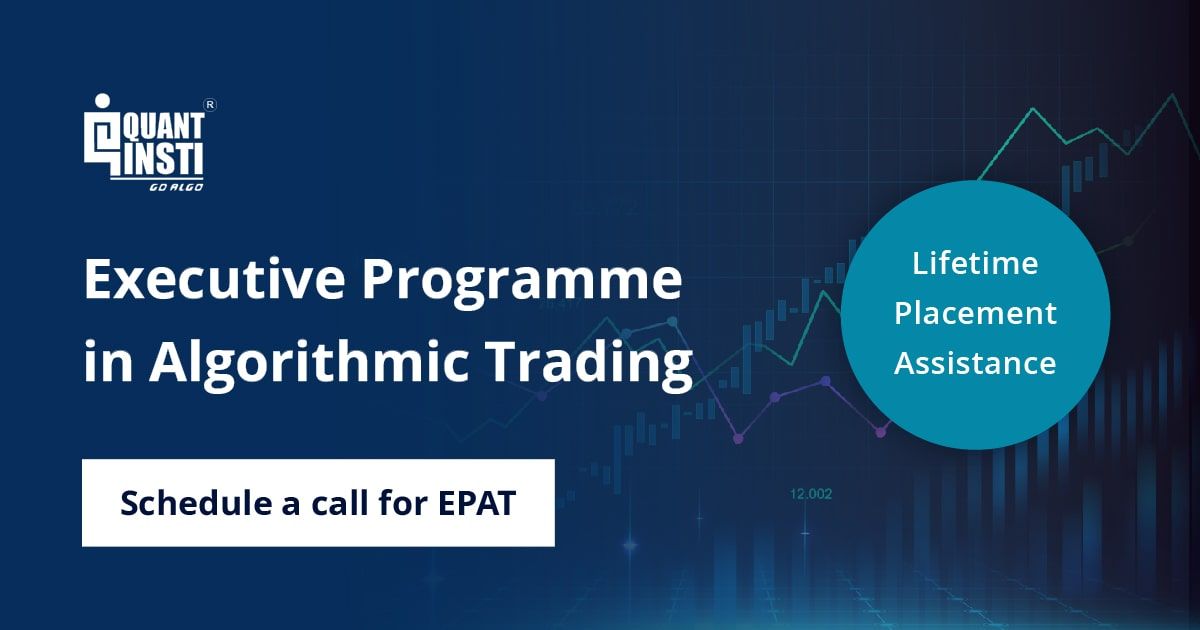It is quite true that in the present, a key part of knowledge for a trader would be his trading software. Especially when it comes to Algorithmic Trading that performs in milliseconds to microseconds.
It takes knowledge of the markets, awareness of stocks, forex, strategies, futures, charting, data analysis, indicators, etc. to develop a broad understanding of the industry as a whole. However, the creation of programs, algorithms and strategies etc. are at the heart of Algorithmic Trading.
The question remains though: How?
The best possible way would be to learn, educate and train oneself about Algorithmic Trading. It is amazing to learn from Debdutta, a certified EPATian and an experienced professional in the truest sense of the words.
Let’s see what he has to say about his journey which has established him at par with the Quants in the domain of Algorithmic Trading.
Tell us about yourself
Hi, I’m Debdutta Bhattacharya, VP, Credit Risk and Finance at JPMorgan Chase. Academically, I have a Bachelor’s Degree in Electrical Engg. from Jadavpur University, Kolkata and a Masters in Electrical and Computer Engineering specializing in Neural Networks, from Clemson University, USA.
What has your work experience been prior to the Executive Programme in Algorithmic Trading (EPAT)?
Previously I was occupied with designing software systems relating to Loan Prequalification, Credit Risk Analysis and Credit and Decisioning, Distributed Messaging and Financial Reporting. I’ve had experience with Trading Stocks, Options and Index Futures as well.
What encouraged you to change your domain?
After years of engaging in directional trading, it dawned on me that success in trading is not about being right on the direction of the instrument but identifying and trading opportunities that offer a statistical edge. QuantInsti® taught me the tools to find those opportunities and the strategies to take advantage of those opportunities.
What barriers did you have to face to become a Quant?
The biggest challenge is to learn to think about the markets and its transactions in terms of probabilities. Next comes the belief in the methods through continuous validation. The EPAT curriculum offered a good mix of theory and practice to establish in the student the necessary foundational knowledge and the skills for primetime market action.
How has EPAT helped you?
EPAT taught me the analysis tools, trading strategies and backtesting methodology to test the performance of the strategies. EPAT also promoted independent thinking and offered consultation to evaluate my own strategies. All of that learning and encouragement has led me to beat the markets this year. The education is paying off and I hope to maintain my profitability through diligent backtesting of my trading ideas.
How has your journey of being a part of Algo Trading been so far?
The EPAT curriculum is like no other. The unique blend of theory and practice develops the necessary acumen to wrangle with the markets with confidence. And most of all the student comes out of the program with some sound strategies that he can employ right away.
How have your new skills contributed to your professional life?
When one starts to see the world in terms of probabilities and realizes that while he can control very little, his success depends on his ability to find high probability opportunities with a statistical edge. This paradigm shift in his thought process opens up a rainbow of opportunities that he can evaluate and after due diligence, finally, employ with complete confidence. This is an invaluable gift of the EPAT programme.
So, what’s next?
My goal is to build a successful full-time trading business. To that end, I am building algorithms with built-in risk management that allows me to trade at scale and scale in and out of positions. On the side, I would like to contribute to building a trading education curriculum that draws directly from real-time experiences of the best traders on the markets.
Any message for the aspiring Quants?
Success in trading depends on one’s ability to find those opportunities with a statistical edge. Learn the tools and techniques of quantitative analysis. The EPAT programme provides an excellent curriculum and the support of the EPAT alumni will provide you necessary encouragement to take it all the way. Most of all remember there is nothing like the joy of creating your own automated strategies and see your creation successfully navigating the markets.
Conclusion
Firms like Citibank are finding it easier to employ Programmers and Coders and train them in the field of Trading, as reported recently. Their experience and skills give them a widespread understanding of the overall aspect of trading. Debutta serves as an inspiration and an ideal to all aspiring Quants who wish to be a part of Algorithmic and Quantitative Trading. You can do it too.
Next Step
If there is any learning that could guide you on the right path on this feel free to check out the Executive Programme in Algorithmic Trading (EPAT). You could contact us here as well. Help us help you.
EPAT equips you with the required skill sets to be a successful trader. It covers training modules like Statistics & Econometrics, Financial Computing & Technology, and Algorithmic & Quantitative Trading. Enroll now to begin your career in Algorithmic Trading.
Disclaimer: In order to assist individuals who are considering pursuing a career in algorithmic and quantitative trading, this case study has been collated based on the personal experiences of a student or alumni from QuantInsti’s EPAT® programme. Case studies are for illustrative purposes only and are not meant to be used for investment purposes. The results achieved post completion of the EPAT® programme may not be uniform for all individuals.

